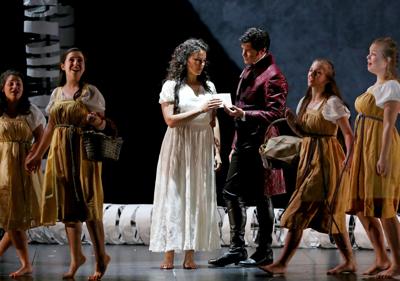Charleston is a lot of things, but it’s not an opera town. One can hear fine singing, mostly of a choral nature. Rarely do audiences get to attend a full-scale opera production, and then only thanks to Spoleto Festival USA.
This year, two of the festival’s three opera offerings are especially appealing to those who like to revel in great vocal writing and sumptuous singing. Vivaldi’s “Farnace” is an explosion of baroque fireworks. Tchaikovsky’s “Eugene Onegin,” on view at the Gaillard Center, is a romantic (and Romantic) classic by one of the finest melody writers ever.
The production of “Onegin,” a Spoleto Festival original, benefits from an excellent cast of singers, terrific ballet numbers choreographed by Ruthy Inchaustegui and innovative direction and set design.
The Gaillard Center performance hall presents a challenge during festival time: the director of an opera production must figure out a way to do more with less, since the hall hosts a variety of concurrent performances, and since big and complicated sets therefore are unrealistic.
So Chen Shi-Zheng (who directed Spoleto Festival’s “Matsukaze” in 2013, “Monkey: Journey to the West” in 2008, and “The Peony Pavilion” in 2004) seized on the idea of employing birch trees in different configurations to evoke a Russian landscape. They could be dropped to the stage from above and maneuvered to and fro.
The effect is mesmerizing at first, and heightened by a tasteful use of video, both displayed against a surface and projected onto the stage in ways that animated the trees. Chen is adept at this minimalist approach. As the opera neared its conclusion, even the trees were removed, leaving little but a circle of light and shadowy video images.
It was also a bit limiting. After a while, I wanted to see something different: the country house, for example, a ballroom, the banquet hall. Instead, all the action took place in the woods.
The story, in a nutshell, is about a depressed young woman, Tatyana, who falls in love with a bored, haughty and rich neighbor, Eugene Onegin. He spurns her declaration of love, somewhat politely, then proceeds to dance with his friend Lensky’s objet d’amour, Olga. Lensky takes offense and challenges Onegin to a duel in which the bored and haughty man remains standing.
A twinge of regret fuels years of travelling abroad, but eventually Onegin, still bored, returns to the birch grove, learns that Tatyana is now married to a wealthy older man, and decides that his amorous passions were not extinguished permanently after all. Now it’s his turn to declare his love, but Tatyana keeps her head about her and refuses to betray her husband. Onegin is left heartbroken and bereft.
One might be forgiven for psychoanalyzing the whole thing. If only there were serotonin reuptake inhibitors back then; if only Lensky had suggested to Onegin (when they were still friends) that the latter’s ennui perhaps had roots in privilege and a distorted view of women. I was tempted to conclude that Onegin was, in fact, gay, and perhaps that explained his disinterest in the gorgeous Tatyana, the braggadocio in his comportment, the misunderstanding with his dear friend and the restless urge to travel. Tchaikovsky was gay, after all; maybe he was channeling his own feelings through Onegin.
In any case, the singers were stellar, all of them. Russian soprano Natalia Pavlova sang with melancholy warmth and a stunning tone, especially evident in the Letter Scene. Beautiful and poised, she commanded the role, portraying the young Tatyana with just the right note of innocence and the older, married Tatyana with just the right note of experience. I cheered when she rejected that arrogant, pompous hypocrite.
The hypocrite, played by Franco Pomponi, was fabulous. His presence included an aura of mystery that any young woman might find alluring. And Pomponi’s baritone was substantial yet lyrical, managing Tchaikovsky’s melodious lines with aplomb.
Krysty Swann as Olga was captivating, her optimism and good humor contagious, her singing a delight. Her love interest, Lensky, was played by New Orleans native Jamez McCorkle, who is someone for opera fans to follow closely. His tenor voice is substantial, expressive and flexible. It was on full display in the excruciatingly beautiful farewell aria he sings before the duel. He can go from loud to soft, even high in his range, seamlessly. McCorkle has made this role his own.
The singers in secondary roles, such as Mary Phillips playing Tatyana’s mom and Tichina Vaughn playing Tatyana’s nanny, also were excellent. There’s a terrific tune that comes in the second half, sung in French, by a frivolous character called Triquet (tenor Nathan Granner) that’ll have you smiling. Granner sings it beautifully. And bass Peter Volpe, playing the old husband, sang a showstopper when he appeared toward the end of the opera.
Though the story is derived from a novel in verse by the great Russian writer Alexander Pushkin, it’s the music that carries the day. Who can resist Tchaikovsky’s glistening melodies and innovative harmonic shifts, the way he alternates between levity, acuity and melodrama?
Westminster Choir members made up the spot-on chorus, singing crisply and with gusto. One expects nothing less from them. The young musicians in the pit played with accuracy and vigor under the energetic guidance of Evan Rogister.
And I mustn’t forget to praise the dancers: Without their balletic prancing and acrobatics (some of which was informed by hip-hop!), the production certainly would have shined less brightly.







